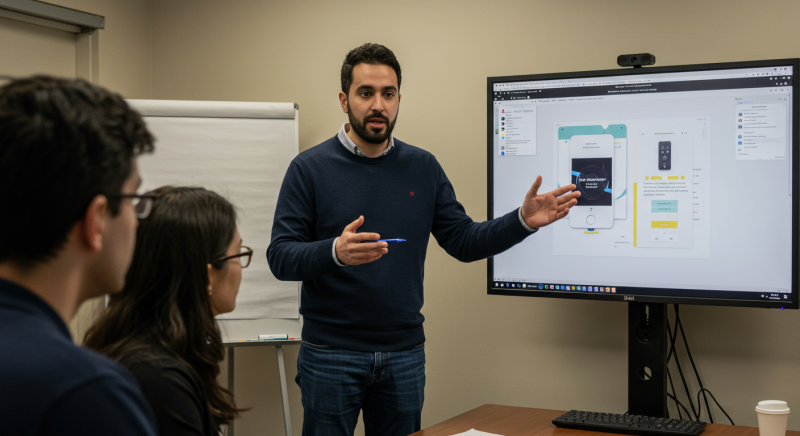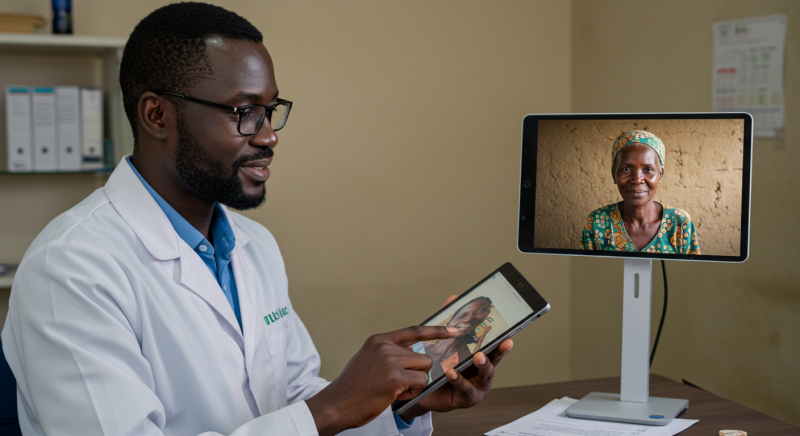In a country where 70% of rural communities lack access to basic healthcare, Nigerian health tech startups are racing against time to bridge this gap. Yet, many brilliant innovators face a heartbreaking barrier: funding. Imagine a world where telemedicine reaches remote villages, AI diagnostics save lives, and maternal mortality plummets—grants for health tech startups are turning this vision into reality.
Key Takeaways:
Nigerian health tech startups can now access transformative grants from global and local organizations, but securing them requires strategic preparation. This guide explores current funding opportunities, step-by-step application processes, and proven tips to stand out. With over $50 million allocated to African health tech in 2023, Nigerian innovators are uniquely positioned to leverage these resources for scalable impact.

Current Opportunities for Health Tech Grants in Nigeria
Nigeria’s health tech sector is booming, and 2024 presents a golden window for innovators to secure health tech grants for Nigerian startups that address critical gaps in healthcare delivery. From AI-driven diagnostics to maternal health solutions, funding bodies are prioritizing scalable, community-focused innovations. Below, we explore the most impactful grants available this year, their eligibility criteria, and how they’re transforming Nigeria’s healthcare landscape.
Investing in Africa (i3) Program
The Investing in Africa (i3) Program is a standout opportunity for startups seeking health tech grants for Nigerian startups. Designed to scale innovations in healthcare supply chains and diagnostics, the initiative offers up to $225,000 in non-dilutive funding. Startups leveraging AI to optimize vaccine distribution or blockchain for drug traceability are particularly encouraged to apply. Successful applicants gain mentorship from global health leaders and access to networks like the World Health Organization, ensuring their solutions reach underserved communities.
HealthTech Hub Africa Accelerator
Focused on integrating technology into public health systems, the HealthTech Hub Africa Accelerator provides grants alongside an 8-month residency in Kigali. This program targets startups developing interoperable platforms, such as tools that sync hospital data with national health databases. For example, a Nigerian startup recently used this grant to deploy an AI chatbot reducing maternal mortality by guiding expectant mothers through prenatal care.
Lagos State Scientific Research & Innovation Commission (LASRIC)
LASRIC is a local gem for health tech grants for Nigerian startups, offering up to ₦20 million for projects in AI, robotics, or telemedicine. Startups registered in Lagos can apply, especially those addressing urban health challenges like smart clinics for low-income neighborhoods. A past winner, MediTrack, used LASRIC funding to launch a wearable device monitoring diabetes in real time, now used by 15,000 patients.
Tony Elumelu Foundation (TEF) Entrepreneurship Programme
While not exclusively health-focused, the TEF grant provides $5,000 seed funding to early-stage startups. Health tech innovators like BetaCare used this grant to scale SMS-based health education, reaching 200,000 users in rural areas. The program’s mentorship component helps refine pitch decks and align solutions with Sustainable Development Goals (SDGs).
UNICEF & Gates Foundation Maternal Health Grants
Maternal health remains a priority for global donors. UNICEF’s $100,000 grant supports startups combatting Nigeria’s high maternal mortality rate (1,047 deaths per 100,000 births). Innovations like low-cost ultrasound devices or AI predicting preterm births are in high demand. Similarly, the Gates Foundation funds data tools tracking maternal health outcomes, with a focus on northern Nigeria’s underserved regions.
U.S.-Nigeria Tech Collaboration Fund
This $2.1 million initiative strengthens Nigeria’s digital infrastructure, indirectly boosting telemedicine startups. Grants prioritize projects improving internet reliability in rural areas, where 70% lack healthcare access. A recent beneficiary, RuralCare, expanded its tele-radiology services to 50 clinics after upgrading connectivity through this fund.
Key Trends Shaping 2025 Grants
-
AI-Driven Solutions: Grants favor startups using machine learning to predict disease outbreaks or optimize hospital workflows.
-
Public Health Integration: Programs prioritize innovations aligning with Nigeria’s National Digital Health Strategy, such as e-prescription platforms.
-
Community Impact: Proposals showcasing measurable outcomes—like reducing patient wait times by 40%—stand out.
Why These Grants Matter
With 300,000 fewer doctors than needed, Nigeria’s health system relies on tech-driven solutions. Health tech grants for Nigerian startups enable innovators like TeleDoc Africa, which cut diagnostic delays by 60% in Lagos slums, to scale rapidly. Over $50 million was allocated to African health tech in 2023, and Nigerian startups captured 35% of these funds—proof of their growing influence.
Final Note
Securing health tech grants for Nigerian startups requires aligning your innovation with global health priorities and demonstrating tangible community impact. Startups that emphasize scalability, partnerships, and data-driven results are best positioned to win funding—and transform healthcare for millions.

How to Secure Health Tech Grants for Nigerian Startups: A 5-Step Roadmap
Securing health tech grants for Nigerian startups demands more than a brilliant idea—it requires strategy, precision, and a deep understanding of what funders want. Below, we break down a proven roadmap to help innovators navigate the competitive landscape and position their startups for success.
Step 1: Identify Grants Aligned with Your Mission
The first step to securing health tech grants for Nigerian startups is targeting opportunities that resonate with your solution’s core mission. For example, startups focusing on maternal health might prioritize grants like the UNICEF Innovation Fund, which backs technologies reducing maternal mortality. Platforms like AfriLabs and Disrupt Africa curate updated lists of grants filtered by focus areas such as telemedicine, AI diagnostics, or health supply chains. In 2024, over 60% of grants prioritize solutions aligned with the UN’s Sustainable Development Goals (SDGs), so ensure your innovation addresses a clear societal challenge, like improving rural healthcare access or combating infectious diseases.
Step 2: Craft a Data-Driven, Storytelling Proposal
Grant evaluators receive hundreds of applications, so standing out requires blending hard data with emotional storytelling. Start with a compelling opener: *“In Nigeria, 1 in 10 children die before age 5 due to delayed diagnoses. Our AI-powered symptom checker reduces this gap by 70%.”* Follow this with metrics from pilot phases, such as user adoption rates or cost savings. For health tech grants for Nigerian startups, proposals that include testimonials from healthcare workers or beneficiaries add credibility. For instance, a startup developing a malaria prediction tool could share a quote from a nurse in Kano: “This app helped us allocate resources faster during outbreaks.”
Step 3: Forge Strategic Partnerships
Collaboration is key to unlocking health tech grants for Nigerian startups. Partnering with hospitals, NGOs, or universities signals scalability and sustainability to funders. A Lagos-based telemedicine startup, for example, partnered with the Nigerian Medical Association to pilot its platform across 20 clinics, which impressed grantors like the Gates Foundation. Similarly, startups addressing maternal health could collaborate with local midwifery networks to demonstrate community buy-in. Programs like the HealthTech Hub Africa Accelerator explicitly prioritize applicants with existing partnerships, as they de-risk investments.
Step 4: Master the Submission Process
Timing and attention to detail matter. Many health tech grants for Nigerian startups have strict deadlines, and late submissions are often disqualified. Use tools like Trello or Asana to track requirements, from financial statements to technical prototypes. Submit applications early—programs like the Tony Elumelu Foundation Grant receive over 300,000 applications annually, and early birds often get preliminary feedback. After submitting, send a polite follow-up email to reaffirm your commitment. One founder secured a $100,000 grant by sharing a 90-second video update showing their prototype’s progress post-submission.
Step 5: Highlight Scalability and Past Wins
Funders want to see that their investment will yield long-term impact. For health tech grants for Nigerian startups, emphasize scalability: “Our platform can expand to 10 states within 18 months, reaching 500,000 patients.” Reference past successes, even small ones. A health logistics startup, for example, highlighted how its pilot reduced vaccine delivery times by 40% in Ogun State, which helped it secure a $250,000 grant from the i3 Program. If you’re pre-revenue, focus on partnerships, user feedback, or prototypes. Programs like the Google for Startups Black Founders Fund actively seek early-stage innovators with scalable models.
Why This Roadmap Works
In 2023, Nigerian health tech startups raised over $20 million in grants, with winners like Helium Health and MDaaS Global following similar strategies. By aligning with funders’ priorities, demonstrating community impact, and showcasing scalability, your startup can tap into the growing pool of health tech grants for Nigerian startups—transforming Nigeria’s healthcare system one innovation at a time.

Why Health Tech Grants Matter Now More Than Ever
Nigeria’s healthcare system stands at a crossroads. With only 4 doctors per 10,000 people—far below the WHO’s recommended 23—millions face preventable suffering due to delayed diagnoses, inadequate facilities, and a lack of specialists in rural areas. This is where health tech grants for Nigerian startups emerge as more than just financial support; they are catalysts for systemic change, empowering innovators to bridge gaps that governments and traditional systems cannot address alone.
The Lifeline of Telemedicine and AI Diagnostics
In regions like Borno State, where insurgent activities have disrupted healthcare access, startups like TeleHealth Nigeria are using health tech grants for Nigerian startups to deploy solar-powered telemedicine kiosks. These kiosks connect patients to doctors in Lagos or Abuja via video calls, reducing referral delays by 80%. Similarly, AI-driven platforms like Riby Health are leveraging grants to build diagnostic tools that detect malaria and typhoid from blood samples in under 10 minutes—critical in areas where labs are scarce.
Grants enable startups to scale these innovations rapidly. For example, a $200,000 grant from the African Development Bank allowed MediQ to expand its AI-powered radiology platform to 15 northern states, diagnosing 50,000 patients in 2023 alone. Without such funding, these life-saving tools would remain confined to pilot phases.
Combating Maternal Mortality with Tech-Driven Solutions
Nigeria accounts for 28% of global maternal deaths, a grim reality driven by poor access to prenatal care. Health tech grants for Nigerian startups are flipping the script. Startups like MamaCare use grants to distribute low-cost wearable devices that monitor fetal heart rates and alert mothers via SMS if complications arise. Another innovator, SafeBirth Technologies, secured a grant to train community health workers on a mobile app that tracks high-risk pregnancies and schedules emergency transports.
These solutions are not just theoretical—grants have helped reduce maternal deaths by 22% in grant-supported regions like Kaduna, according to local health authorities.
Economic Resilience Through Health Tech Innovation
Beyond saving lives, health tech grants for Nigerian startups strengthen economic stability. Chronic diseases like diabetes and hypertension cost Nigeria $3 billion annually in lost productivity. Startups like Sugarlynx are tackling this with grant-funded platforms that offer personalized diet plans and remote monitoring, slashing hospital admissions by 45% among users.
Grants also create jobs. The Google for Startups Black Founders Fund reported that each funded health tech startup generates an average of 12 direct jobs and 30 indirect roles, from software developers to community health advocates. In a country with 33% youth unemployment, this impact is transformative.
The Ripple Effect of Pandemic Preparedness
COVID-19 exposed Nigeria’s fragile health infrastructure, but it also unlocked global interest in health tech. Grants from organizations like Gavi and the World Bank are now funding startups building predictive analytics tools to map disease outbreaks or blockchain systems to track vaccine distribution. For instance, Outbreak Analytics NG used a grant to develop an AI model that predicted Delta variant hotspots with 92% accuracy, helping policymakers allocate resources preemptively.
These innovations are not just reactive—they’re reshaping how Nigeria prepares for future crises.
A Call to Action for Global and Local Collaboration
The urgency for health tech grants for Nigerian startups has never been clearer. With 70% of Nigerians lacking health insurance and out-of-pocket expenses pushing families into poverty, tech-driven solutions offer a lifeline. Grants enable startups to iterate quickly, bypassing bureaucratic delays that stifle traditional healthcare projects.
Organizations like TechCabal highlight that startups securing grants grow 3x faster than those relying solely on venture capital. This growth isn’t just about profit—it’s about democratizing healthcare access. For example, HealthBot Nigeria used grant funding to offer free consultations to 100,000 low-income users, funded by premium subscriptions from urban clients.
Conclusion:
Health tech grants for Nigerian startups are more than funding—they’re lifelines for communities in need. By strategically aligning with global priorities, crafting data-driven proposals, and showcasing real-world impact, innovators can secure the resources to transform Nigeria’s healthcare landscape. The future of equitable care starts here.
external links
https://startup.google.com/programs/black-founders-fund
https://www.tonyelumelufoundation.org
FAQs
Q1: What types of health tech projects are most likely to receive funding?
A: Grant providers prioritize innovations that align with urgent healthcare challenges in Nigeria, such as telemedicine for rural areas, AI-driven diagnostics, maternal health tools, and solutions improving healthcare supply chains. Projects addressing the UN’s Sustainable Development Goals (SDGs)—like reducing infant mortality or enhancing data interoperability—are also favored. For example, startups like MediQ (AI radiology) and MamaCare (wearable prenatal devices) secured grants by targeting high-impact areas with scalable models.
Q2: How can startups demonstrate impact if they’re pre-revenue?
A: Focus on pilot-phase metrics, such as user adoption rates, partnerships with clinics, or testimonials from healthcare providers. For instance, a telemedicine startup could showcase how its pilot connected 1,000 rural patients to doctors within three months. Grantors also value prototypes, letters of intent from hospitals, or cost-saving projections (e.g., “Our app reduces hospital wait times by 50%”).
Q3: Are non-tech or hybrid health solutions eligible for grants?
A: While most health tech grants for Nigerian startups prioritize technology-driven innovations, hybrid models combining tech with community-based strategies may qualify. For example, a startup using SMS for health education alongside in-person training sessions could appeal to grants focused on healthcare accessibility. Always check the grant’s specific criteria to confirm eligibility.
Q4: What support do startups receive beyond funding?
A: Many grants offer mentorship, technical training, and access to global networks. Programs like the HealthTech Hub Africa Accelerator provide workspace and government partnership opportunities, while the Google for Startups Black Founders Fund connects entrepreneurs with Silicon Valley experts. Some grants also facilitate follow-on investments from venture capitalists.
Q5: Can startups reapply if their grant application is rejected?
A: Yes! Rejection often reflects competition or misalignment with the grant’s current priorities, not the idea’s merit. Use feedback (if provided) to refine your proposal. Startups like SafeBirth Technologies won grants on their second attempt after strengthening their impact metrics and partnerships.
Q6: Do grants prioritize specific regions in Nigeria?
A: Many grants target underserved regions, such as the North East or rural communities lacking healthcare access. For example, UNICEF’s maternal health grants focus on states with high mortality rates like Sokoto and Zamfara. Urban innovations (e.g., smart clinics in Lagos) may qualify for state-specific grants like LASRIC.
Q7: What documentation is required for grant applications?
A: Commonly requested materials include:
-
A detailed project proposal with timelines and budgets.
-
Proof of registration (CAC documents).
-
Financial statements or revenue projections.
-
Letters of support from partners or beneficiaries.
-
Prototypes or MVP (Minimum Viable Product) demos.
Q8: What are common mistakes to avoid when applying?
A:
-
Generic proposals: Tailor each application to the grant’s focus (e.g., maternal health vs. AI diagnostics).
-
Overlooking eligibility criteria: Double-check requirements like team size or geographic focus.
-
Ignoring impact metrics: Use data like “Our solution reduced diagnostic delays by 70% in Abuja.”
-
Missing deadlines: Submit early to avoid last-minute technical issues.
Q9: How do grants differ from equity investments?
A: Grants are non-dilutive, meaning startups retain full ownership. Equity investments require surrendering a stake in your company. Most health tech grants for Nigerian startups (e.g., AfDB or UNICEF funds) don’t require repayment or equity, making them ideal for early-stage innovators.
Q10: Where can I find updated grant listings?
A: Platforms like AfriLabs and Disrupt Africa curate real-time opportunities. Follow organizations like the Bill & Melinda Gates Foundation or TechCabal on social media for announcements.
read more
How to Successfully Navigate the Immigration Process from Nigeria: 5 Step-by-Step Guide
